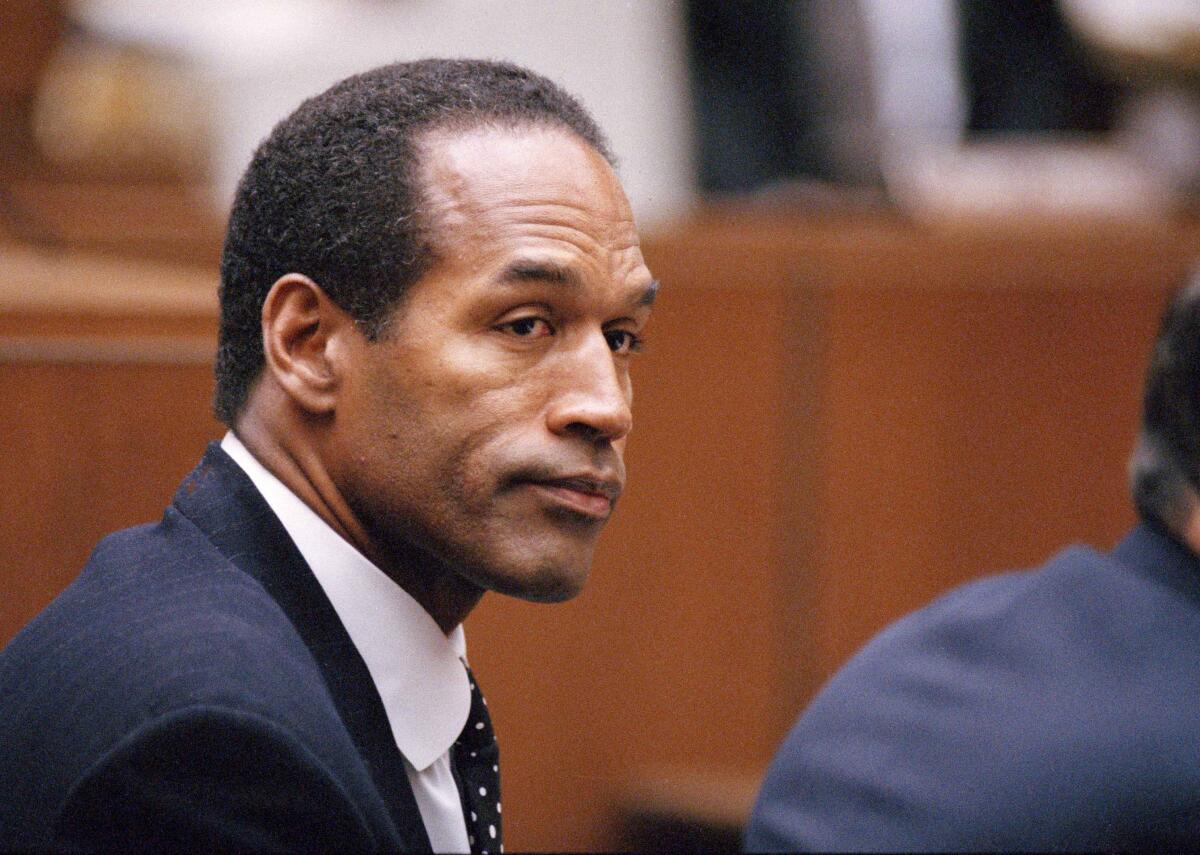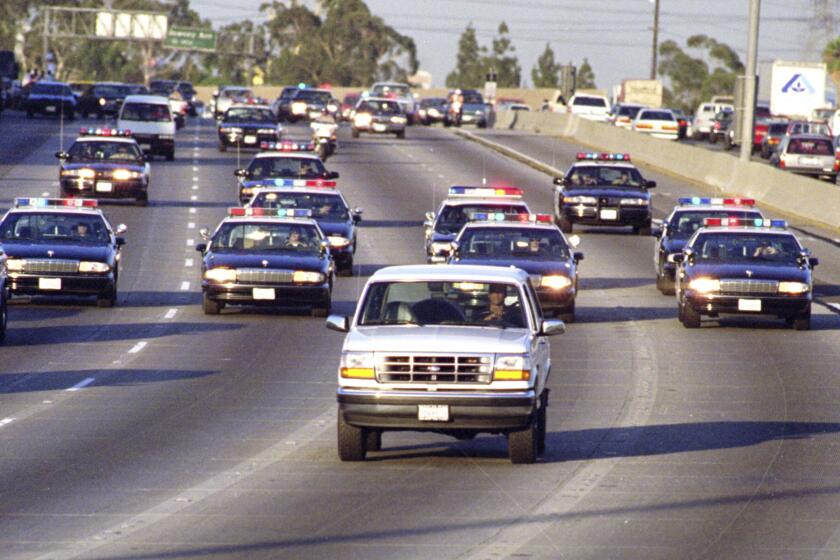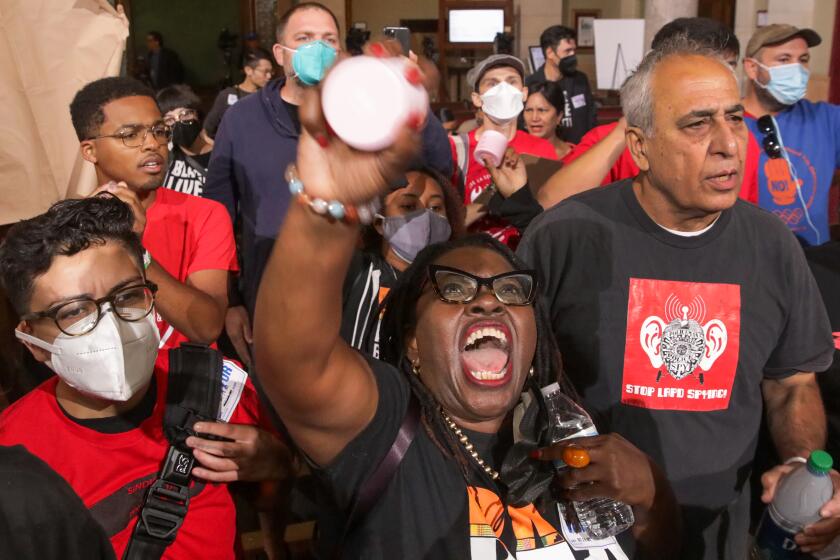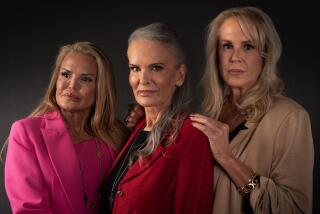O.J. Simpson, race and justice. It’s the debate that won’t go away

- Share via
I can’t say I’ve spent much time thinking about O.J. Simpson over the last three decades. But hearing Thursday that he died of cancer reminded me of two conversations that I’ve had about him in the last six months.
The first one was with a Black man who worked in Los Angeles city government in 1995 — the year the once-celebrated football star and actor was infamously acquitted in the murders of his ex-wife, Nicole Brown Simpson, and her friend Ronald Goldman.
When the verdict was delivered, the Black man told me he and his co-workers were glued to the TV, just like everyone else in America. He recounted calmly and quietly walking outside, looking to make sure no one was around and then cheering.
“I didn’t want to scare all the white people,” he told me.
O.J. Simpson, whose rise and fall from American football hero to murder suspect to prison inmate fueled a public drama that obsessed the nation, has died.
I understood. It’s not that he necessarily believed Simpson was innocent. In fact, that was beside the point. He was just happy that, at last, after the explosive fallout of a jury acquitting the white LAPD officers who beat Rodney King, a Black man had finally beaten the odds of a systemically racist criminal justice system.
“I mean, how many rich white people are guilty and go free in this country every day?” he asked, the answer obvious.
The second conversation I had was with a friend of my mother’s — a white woman who was living in Torrance in 1995. I told her about what the Black man had said, and she shook her head.
“All the Black people thought he was innocent,” she insisted.
No, I told her, that wasn’t entirely true. Sure, many Black people believed the Los Angeles Police Department had set Simpson up — and why wouldn’t they believe that? Particularly after one of the key witnesses for the prosecution, LAPD Detective Mark Fuhrman, was caught lying about using racial slurs and after Simpson couldn’t fit into a glove Fuhrman said he found, without a warrant, at the crime scene.
But there also were plenty of Black people privately joking that the LAPD had “just framed a guilty man.” My college friends and I had made similar assessment while obsessively following the trial from Ohio.
My mother’s friend looked baffled. “Well,” she said at last, “I never heard that.”
Veteran court reporter and legal analyst Jeffrey Toobin, who made a name for himself covering this “trial of the century,” once said that the only reason “we will care about O.J. Simpson 10 years after, 20 years after, is what it told us about race in this country.”
It has been longer than that, and Toobin is still right.
Simpson was, and even in death, still is something of a Rorschach test — definitely for Angelenos, but really for all Americans. On to the question of his guilt or innocence, we’ve put our views on race and racism, policing and the criminal justice system, and wealth and privilege.
O.J. Simpson’s white Bronco chase on weirdly empty freeways in Los Angeles became an indelible memory and ‘locked people into this common emotional experience.’
After all, as a former Heisman Trophy winner who went on the NFL and Hollywood, Simpson had the money to hire the best legal team — the “dream team” — to defend him. And ensconced in tony Brentwood, he’d also had the power to create a narrative about himself, one that largely papered over the many portrayals of him as an abuser, though it all would come out a few years later.
It wasn’t until 2015, according to a Washington Post-ABC News poll, that the racial divide over whether he was “definitely” or “probably” guilty had finally narrowed, seemingly for good. And there was still quite a gulf, with 83% of white Americans saying he had committed murder compared with 57% of Black Americans.
No one knows what those percentages would be today, as pollsters seem to have gotten tired of asking Americans the question. But if the reaction to his death is any indication, particularly on social media, we seem to be as divided as ever.
Caitlyn Jenner, who was once married to Nicole Simpson’s best friend Kris Jenner, posted: “Good Riddance.”
And Fred Goldman, the father of Ron Goldman, told NBC News, “The only thing I have to say is it’s just further reminder of Ron being gone all these years. It’s no great loss to the world. It’s a further reminder of Ron’s being gone.”
Meanwhile, former NFL player Torrey Smith posted: “Regardless of what you may think about him he was innocent in court and has kids out here.” Many lesser-known people have echoed this sentiment, with comparisons to the treatment of accused felon and former President Trump.
And then there are the attempts at nuanced posts, such this one from City University of New York professor Marc Lamont Hill: “O.J. Simpson was an abusive liar who abandoned his community long before he killed two people in cold blood. His acquittal for murder was the correct and necessary result of a racist criminal legal system. But he’s still a monster, not a martyr.”
Why has it been so hard for all of us to see Simpson the same way?
Even after he was found liable for the deaths of his ex-wife and Goldman by a civil court and he moved to Florida to avoid paying the families $33.5 million in damages? And even after he went to prison for armed robbery, kidnapping, conspiracy and other charges for trying to recover memorabilia he claimed was stolen from him?
One year since an audio leak of City Council members’ racist conversation rocked local politics and opened up old racial wounds, the healing process for many Angelenos is still ongoing.
Perhaps it’s because many of us remain locked in our bubbles, not entirely understanding the actions or thought processes of people of other races and ethnicities. We’ve tried to change that since 1995. But we still don’t really know each other, even in a city as inclusive as Los Angeles and a state as diverse as California.
Examples of this abound.
The most recent has to be the leaked recording of four Latino leaders, including three then-members of the L.A. City Council, using racist language while plotting to deprive Black Angelenos of political power. Most striking was how the backroom conversation, revealed by The Times in 2022, was utterly shocking to millions of people, but entirely predictable to millions of others.
As L.A. City Councilman Marqueece Harris-Dawson, who represents a swath of South L.A., told me at the time: “Politicians trying to get the most favorable set of voters is understandable. A sort of a concerted effort to dilute the strength of Black voters is something I expected from Republicans in the South and in the Midwest. I did not expect that level of Black voter suppression in Los Angeles.”
Many told me that what they heard on that leaked recording took them back to the 1990s, reopening what they had assumed were healed wounds over race.
We’re not there yet — not as a city, not as a state or a country. But maybe now we can at least stop arguing about O.J. Simpson.
More to Read
Sign up for Essential California
The most important California stories and recommendations in your inbox every morning.
You may occasionally receive promotional content from the Los Angeles Times.

















